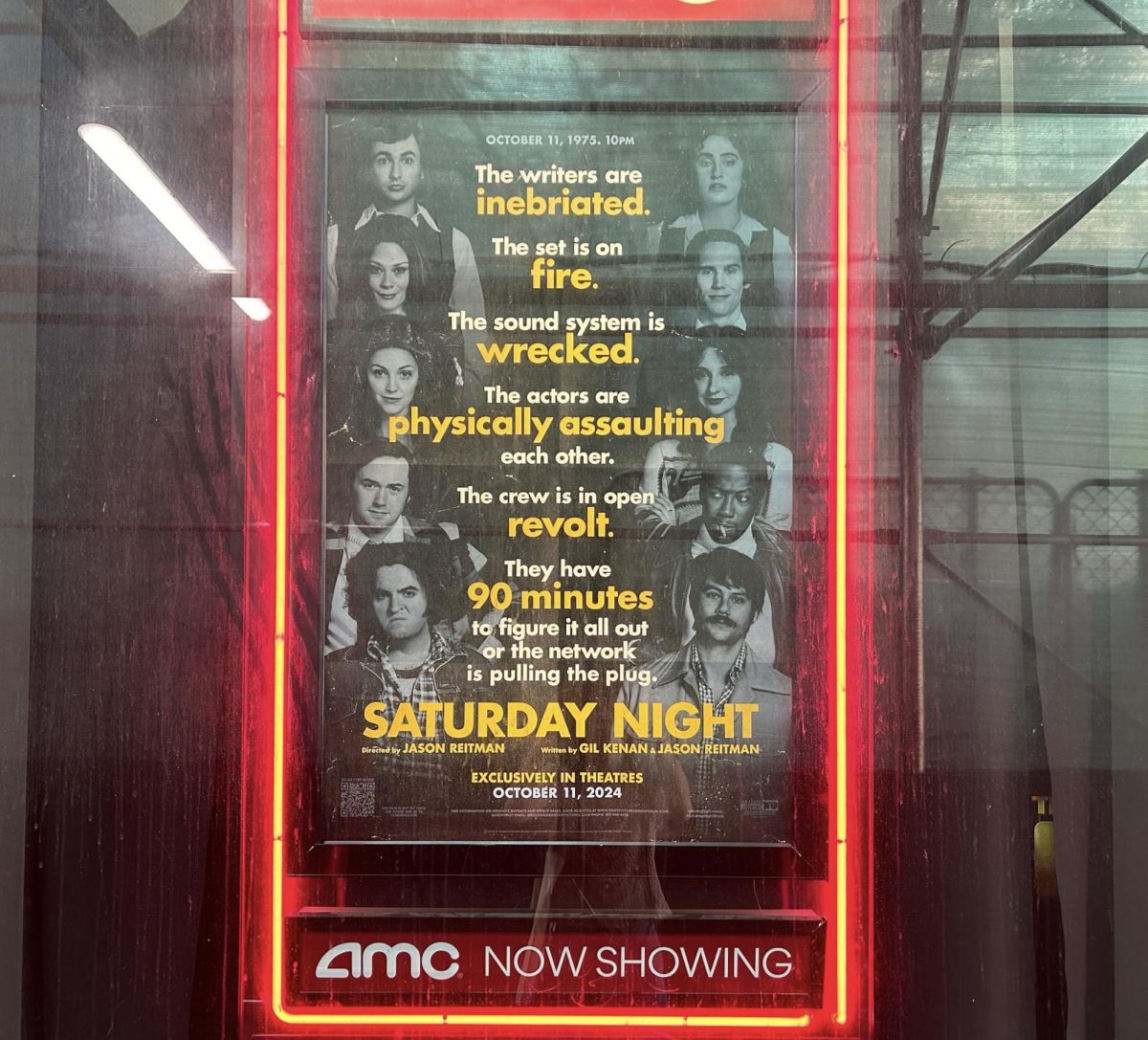The consistent whirlwind of chaos and a stacked cast makes “Saturday Night” like no film I have seen before. I was captivated from the moment I saw Finn Wolfhard as an NBC page, imploring pedestrians to attend a free, live comedy show that night.
Constantly on the edge of my seat, I laughed out loud numerous times and wanted to watch the film again the second the credits rolled.
“Saturday Night” first premiered in August at the Telluride Film Festival and had an early, limited release on Sept. 27 in Los Angeles, New York and Toronto theaters. It was widely released on Oct. 11, directed by Jason Reitman and written by Gil Kenan and Reitman.
A mostly accurate retelling, “Saturday Night” is a portrayal of the insanity during the 90 minutes leading up to the show’s first broadcast at 11:30 p.m. on Oct. 11, 1975.
Many of the cast members sitting around stand up and say, “No, I am Satan.” This immediately took me back to Disney Channel’s iconic “Radio Rebel” scene.
Following Lorne Michaels (Gabriel LaBelle) and his young troupe of comedians and writers, the film showcases the behind-the-scenes tension, drama and high-stakes decisions made in preparation for the show’s debut. Anything you could imagine goes wrong, like a huge stage light falling onto the stage during dress rehearsal, or John Belushi (Matt Wood), an actor, refusing to sign his contract until five minutes before showtime.
The film is skillful in its doppelganger casting and the way that it transports the audience to a frenzied day in the 70s, running around Studio 8H.
As is natural for a film about a sketch comedy show, the standout instances of comedic relief give the film a unique energy, as we see a crew member walking around the chaotic set burning sage, or when a writer, Michael O’Donoghue (Tommy Dewey), tells the Evangelical woman who must approve their script for NBC that he is Satan. Many of the cast members sitting around stand up and say, “No, I am Satan.” This immediately took me back to Disney Channel’s iconic “Radio Rebel” scene.
The soundtrack is also a key component of the film’s excitability and varies from erratic background music to a calming, familiar rendition of “Bennie and the Jets” by Elton John, played on the piano by a cast member.
The best part of “Saturday Night,” however, is its cinematography.
The camerawork is lifelike and adds to the chaos. In one scene, Michaels is in the elevator with Dick Ebersol (Cooper Hoffman), the NBC late-night executive who is in charge of Michaels’ show. The two speak intensely about things already going wrong. The camera rapidly flips from man to man, like a tennis match where viewers whip their heads back and forth to watch the action.
The distinctive cinematography led to many interesting conversations between my friends and I upon exiting the theater.
The soundtrack is also a key component of the film’s excitability and varies from erratic background music to a calming, familiar rendition of “Bennie and the Jets” by Elton John, played on the piano by a cast member.
Music plays in the background for most of the film, except during pivotal scenes where the filmmakers likely wanted every word heard.
This is seen when Michaels and his then-wife, Rosie Shuster (Rachel Sennott), discuss NBC’s desire not to air the show, and Shuster jokingly calls it a revue. Michaels combats this, saying he spent years collecting these “orphan” comedians so does not want to joke about them.
Here, we first see the tension between Michaels and Shuster, and later learn Shuster is having an affair with Dan Aykroyd (Dylan O’Brien). This affair leads to my favorite conversation in the film.
Aykroyd asks Shuster about her and Michaels, and she tells him they were childhood friends, started dating as teenagers, and eventually got married. Next, Aykroyd asks Shuster what she is to Michaels now. Shuster gives a total girlboss response.
Maybe it was meant to be comedic relief — the sort that was typical in the 70s — amid the chaos, but such a self-disparaging comment seems completely unnecessary and did not garner any laughs in the audience.
“I’m not the kid’s sister, or the wife. I’m the writer,” Shuster said.
This quote is one example of the few times “Saturday Night” attempts to touch on sexism, which is my only complaint about the film. There is not enough time to get deeply into this issue during the film, with all of the chaos in Studio 8H, but it seems like the filmmakers used sexism as an additional joke.
For example, at the turn of the film when things finally start going right, a female assistant told Michaels that the lighting director was on set to fix the broken stage light. He said he would be there later, but the assistant told him he needed to come right then because it would “take some misogyny” to make the lighting director work efficiently.
Maybe it was meant to be comedic relief — the sort that was typical in the 70s — amid the chaos, but such a self-disparaging comment seems completely unnecessary and did not garner any laughs in the audience.
Aside from this controversial factor, I enjoyed the film and found many scenes hilarious. My favorite is a sketch for the show where the women cast members, dressed as construction workers, catcall Aykroyd in his tank top and tight denim shorts. Would it be a proper O’Brien movie without some body action?
As we knew it would, everything eventually ends up working out, the show goes live, and we hear Chevy Chase (Cory Michael Smith) say those famous words, “Live from New York, it’s Saturday Night!”
My mind will replay this movie for weeks to come and is full of quotes that my friends and I will be adding to our bank of pop-culture references.
“Saturday Night” is a must-see for anyone who loves SNL, comedy and never-ending drama.



Penny Bolin • Oct 24, 2024 at 5:14 pm
Excellent review!